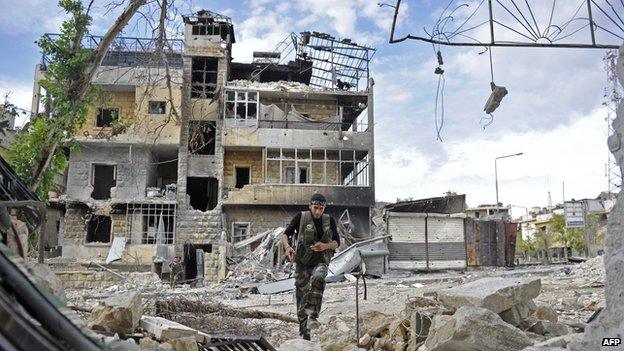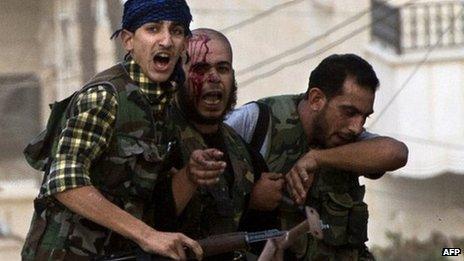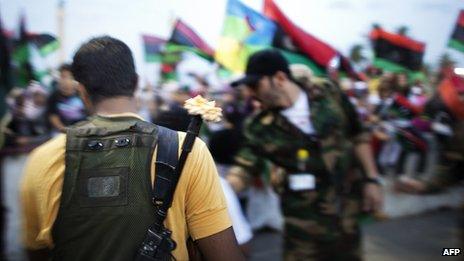Viewpoint: Echoes of Spanish civil war in Syria
- Published

Although Syria's revolutionaries took inspiration from their counterparts in Tunisia, Egypt and Libya, their situation is unique in the Arab world, argues Fouad Ajami. He sees vivid parallels, though, with the Spanish civil war.
Pity the Syrian people. They had been given to believe that fighter jets in the arsenal of the state - those Russian-made MIGs they once viewed with pride - were there for the stand-off with Israel.
Now they know better. The runs over Aleppo, the bombings of Idlib, have laid bare the truth. It is no accident that the founder of this regime, Hafez al-Assad, emerged from the ranks of the air force, which is not often an incubator of coup-makers. There would come a day, the masters of this minority regime doubtless knew, when fighter jets would be used at home.
Israel was always the alibi, the declared enemy. But the Sunni-majority country the Alawites conquered was destined to awake one day, and the rulers prepared for a day of reckoning. The cruel, all-out war between the dictatorship and the vast majority of the population was in the script all along.
Of the rebellions that broke out among the Arabs in the last two years, the struggle in Syria was bound to be a case apart. Think of the Tunisian dictator Zine al-Abidine Ben Ali calling it quits and leaving with his loot, of Hosni Mubarak stepping aside after 18 magical days of protest - this Syrian rebellion's ferocity belongs to a different world of insurrections.
The Syrians must have understood the uniqueness of their situation. They took their time before they set out to challenge the entrenched regime. The first stirrings came two or three months after the other Arabs rose against their rulers. In a refugee camp on the outskirts of Antakya in Turkey, a young lawyer from Jisr al-Shughur - a Sunni town that tasted the full cruelty of the security forces - told me that he had been ready for a long war. He had left his home in the first summer of the rebellion, in 2011, but brought with him his winter clothes.
He was under no illusions about the rulers - they would fight a scorched-earth war. They were a minority, historically disdained, but all powerful. They had risen by the sword, knew no other way, and were certain that defeat on the battlefield would be the end of the world they had carved out over the last four decades.

That lawyer's premonition was borne out. A Sunni society at war with a godless regime sought solace in its faith. The protesters in Deraa, Hama, and Homs had hoped against hope that deliverance would come during the holy month of Ramadan, in August 2011.
In the theology and belief of Islam, there is a Night of Destiny in Ramadan that falls on the 27th night of that holy month. In the Koran, that night is exalted: "Better is the Night of Destiny than 1,000 months. On that night the angels and the spirit by their Lord's leave come down with his decrees." The Syrians who beseeched God's help against the tyranny were sure that they would be done with the regime in that month.
But Ramadan came and went, and then another Ramadan. The regime hung on, defied the odds. The man at its helm, an ordinary, unimpressive man with a lisp, lacking the haiba (the aura, or awesomeness) associated with feared rulers, had refused to bend. He neither boarded a plane for some comfortable exile, nor submitted to the will of his people, and braced himself for a judicial process. He was neither the Tunisian dictator, nor the Egyptian hauled off to court on a stretcher.
Like his Libyan counterpart, Muammar Gaddafi, Bashar was ready to kill for his kingdom. But he was to prove far luckier than the Libyan strongman. For the Libyans, there was a Night for Destiny - a foreign cavalry came to the rescue.
In a magical alignment of the stars, Britain, France, and the United States were drawn into Libya. The League of Arab States which had never stood up to a dictator in its midst gave the green light for a Western military intervention against Gaddafi. He had ridiculed his fellow rulers, he had turned his back on the Arab world, dubbed himself king of the kings of Africa. The powers that be in the Arab councils were more than happy to leave him to Nato's mercy. He had never played by the rules.
And then Gaddafi sealed his fate. He announced his intention to sack the rebellious city of Benghazi, slaughter his way through it, house by house, neighbourhood by neighbourhood, alleyway by alleyway - his words. A reluctant Barack Obama who had wanted to stay away from Arab quarrels was pulled into this fight. He wanted no Rwanda or Srebrenica on his watch, staining his name.
"If I weren't Syrian, I would want to be Libyan," read the placard held by a young protester in the aftermath of Gaddafi's fall. A case of "Libya envy" came to grip the Syrians. The vengeful killing of Gaddafi, that scene when he was dragged from a drainage pipe, was a vicarious relief for the Syrians. This was the end they sought for their hated ruler, and the security barons, and the extortionists around him.
But Libya was like a solar eclipse - once done, it was not to be repeated. It was a fluke, and not a template. The policy-makers in Washington who did Libya would now spend an inordinate amount of time repeating the mantra that "Syria is not Libya".
There was no shortage of reasons. The borders of Syria were more difficult, its neighbourhood more explosive. It had an air force mightier than Libya's. The gates of a sectarian hell would open were Western military power be deployed, and the Islamists would inherit the ruins, etc.
The regime grew more brazen with every crime, and every passing day. The regime's people, the Alawites, were thrown into the fight. They may have had their reservations about Bashar al-Assad, they may have been left out of the loot that had accrued to the regime's functionaries and its Christian and Sunni allies in Damascus and Aleppo, but they could conceive of no viable future without the tyranny. They had taken a ride, and there was no way of dismounting.
Now and then, assurances would be made by the regime's opponents that there would be no wholesale vengeance against the Alawites, but there were no takers for such promises. The Alawite peasants who had descended on Damascus and Homs, and ridden on the coat-tails of the regime, managing to scrape together a small advantage, couldn't be sure what awaited them. There is an oil refinery in the coastal city of Baniyas. It employed 4,000 workers, and only a score of them were Sunnis.
The historical malady of the Arabs, the use of military power, and of sectarian loyalties, to hoard the treasure of the land, has poisoned and wrecked Syrian political life. A Syrian refugee, again in Antakya - a property owner in his home country, an elegant man in his mid-sixties, now herded into the wretchedness of the camps - laid out the facts of his life, and by extension the Syrian malaise.
He had fathered nine children. Two of his sons had been killed, and a third was missing presumed dead. His sons and daughters were reasonably educated, but not one of them, he said, was given a government job, not even that of a sweeper. The Sunni countryside had been neglected, the relative prosperity in Aleppo and Damascus had passed it by. A merchant-military complex in the cities had hoarded things for itself.

Syrians opposed to Assad are "envious" of Libya's revolution
Bashar al-Assad and the trendy cabal around him had trumpeted the "liberalisation" he introduced in the aftermath of his father's death. But this liberalisation amounted to the withdrawal of the state's largesse in the countryside. The overlay of economic and sectarian resentments gave the Syrian rebellion the fury that came to animate it.
Analogies are never perfect, but as I have tracked this rebellion, and read and reflected on it, thoughts of the Spanish civil war have come to mind. The rancid hatred and mercilessness that separates the warring camps in Syria is evocative of that quality of hatred that played out in Spain. Franco had been a tedious, colourless man, but the cruelty was relentless. No Syrian Picasso has yet given Aleppo, bombed by the regime's aircraft, the fame of Guernica, but Guernica was a town of 7,000 people, while Aleppo is a large metropolis, Syria's largest, a city with a fabled history of travel and commerce.
Ours is a different world today. Romantics and communists were drawn to Spain - the Lincoln Brigade, men and women who saw the cause of freedom hanging in the balance in that war. We have no such brigades now. True, some Sunni Islamists, Libyans and others, have made their way to Syria. But they are a trickle, and the Syrians fight alone. They invoke Allah more often than they did at the beginning of their struggle - which is perhaps an accurate reading of their solitude in the world of nations.